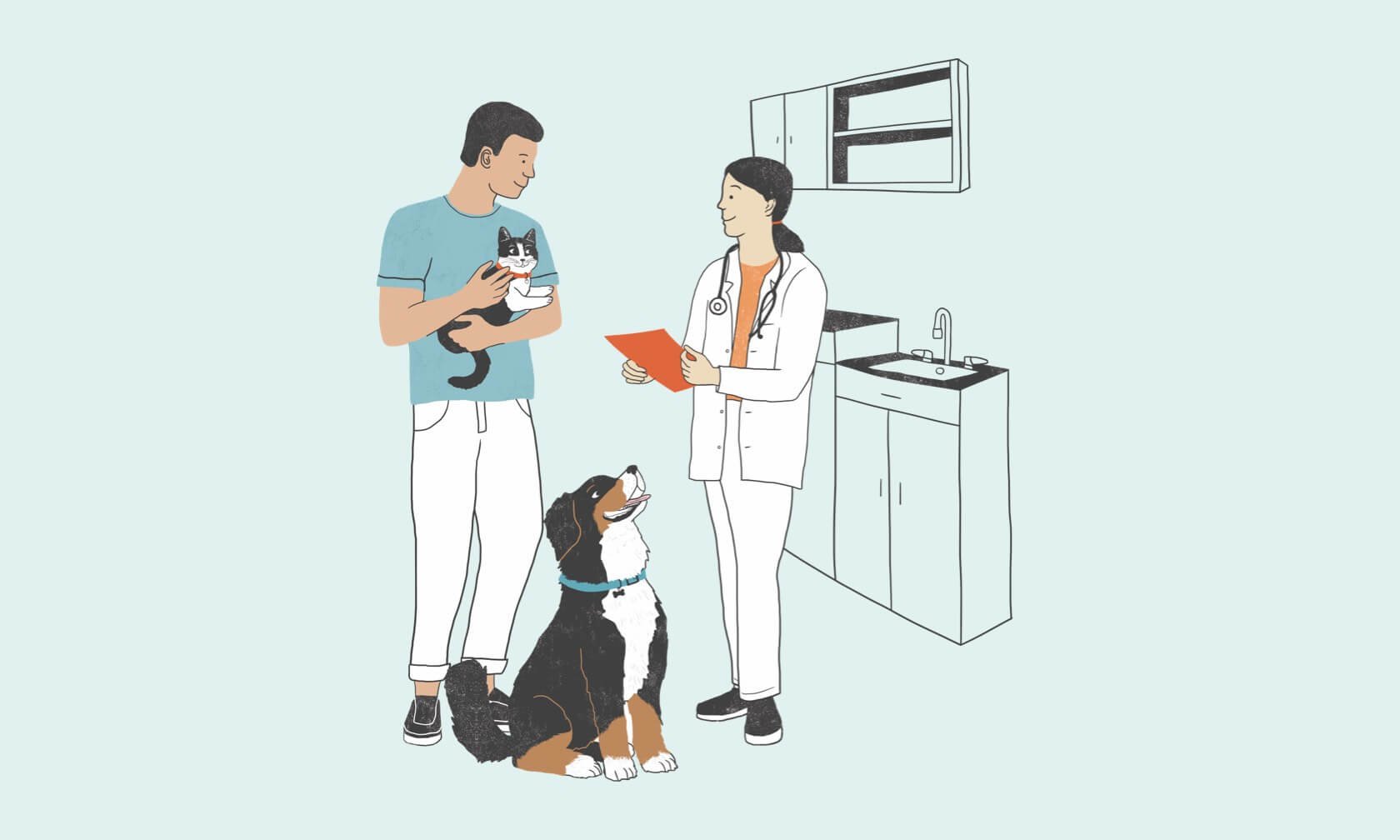Chronic kidney disease (CKD) describes a condition in which the kidneys can’t keep up with their many jobs. Chronic kidney disease affects both dogs and cats and is a prevalent chronic condition of older pets. 55% of cats 5-20 years of age are positive for CKD based on IRIS guidelines,[1] and the median age of onset is 9.5 years old.[2] Inherited kidney defects can also lead to chronic kidney disease but are much less common. Loss of kidney function may be mild, moderate or severe. Treatment and diagnostics needed depends on the age of the pet, clinical signs, and the severity of disease.
Kidney functions
The kidney is responsible for many daily tasks. Kidney damage or insufficiency involves the loss of some, but not always all, of these functions. The following are the kidneys’ responsibilities:
- Water conservation, maintaining hydration status
- Remove toxins from the blood
- Calcium and Phosphorus balance
- Electrolyte and pH balance
- Conserve important blood proteins
- Red blood cell production
- Regulate blood pressure
When any or all of these functions are impaired, clinical signs can result. Sometimes with mild kidney disease, these symptoms will be barely noticeable. It’s important to monitor how much water your pet is drinking and how often they urinate. Ensure they receive regular veterinarian visits to try to notice these symptoms early.

Symptoms of kidney disease in cats and dogs
- Changes in water intake
- Changes in urination (having to go more frequently or having accidents in the house)
- Decreased appetite/not eating
- Weight loss
- Vomiting and/or diarrhea
- Dehydration
- Ulcers on the tongue, gums, and lips
- Pale gums
Diagnosing kidney disease in cats and dogs
A diagnosis of chronic kidney disease is made when there are elevations in chemical substances filtered by the kidneys (such as creatinine and blood urea nitrogen), along with the inability to concentrate their urine, measured by urine specific gravity. To diagnose kidney disease in your pet, your veterinarian may recommend the following tests:[3]
- Complete blood count (CBC). Measures red blood cells, white blood cells, and platelets.
- Urinalysis. Allows the medical team to assess if your pet can concentrate urine normally, if there is protein in the urine, or if there are changes in the cells of the urine that could suggest infection, cancer, or kidney disease. Results of this test also assist in staging your pet’s kidney disease and determine if causes other than kidney dysfunction are present.
- Blood chemistry panel. Provides useful indicators of:
- The health and function of your pet’s organ systems
- Physiologic toxins, if present
- Fluid and electrolyte balance
Medical testing can vary depending on the pet, their presentation, and their medical history. In some cases, your veterinarian may suggest additional testing to help diagnose your pet. Advanced testing may include:
- Urine culture
- Abdominal radiographs (x-rays)
- Abdominal ultrasound
- Kidney biopsy
Treatment of chronic kidney disease
Recommended treatment will vary based on your pet’s quality of life and diagnostic test results. Treatment may include some or all of the following:
- Nutritional recommendations
- Medications
- Nutraceutical supplements
- Lifestyle changes
- Additional testing
- Regular monitoring with your veterinarian
Monitoring your pet’s disease allows your veterinarian to assess the effectiveness of treatment and make changes to medication and diet as needed. Although chronic kidney disease is not curable, appropriate support and diagnostics allow your veterinarian to tailor treatment specific to your pet’s disease state, and potentially slow down the progression of the disease, increasing the quality and length of your pet’s life.
ZPC-00506R1
- Marino CL, Lascelles BDX, Vaden SL, Gruen ME, Marks SL. Prevalence and classification of chronic kidney disease in cats randomly selected from four age groups and in cats recruited for degenerative joint disease studies. Journal of Feline Medicine and Surgery 2013; 16:465–72. doi:10.1177/1098612x13511446.
- Rudinsky, A. J., Harjes, L. M., Byron, J., Chew, D. J., Toribio, R. E., Langston, C., & Parker, V. J. (2018). Factors associated with survival in dogs with chronic kidney disease. Journal of veterinary internal medicine, 32(6), 1977–1982.
- Polzin, DJ, et al., (2017). Chronic Kidney Disease. Textbook of Veterinary Internal Medicine Expert Consult, 2017, 1944;1948;1950.



